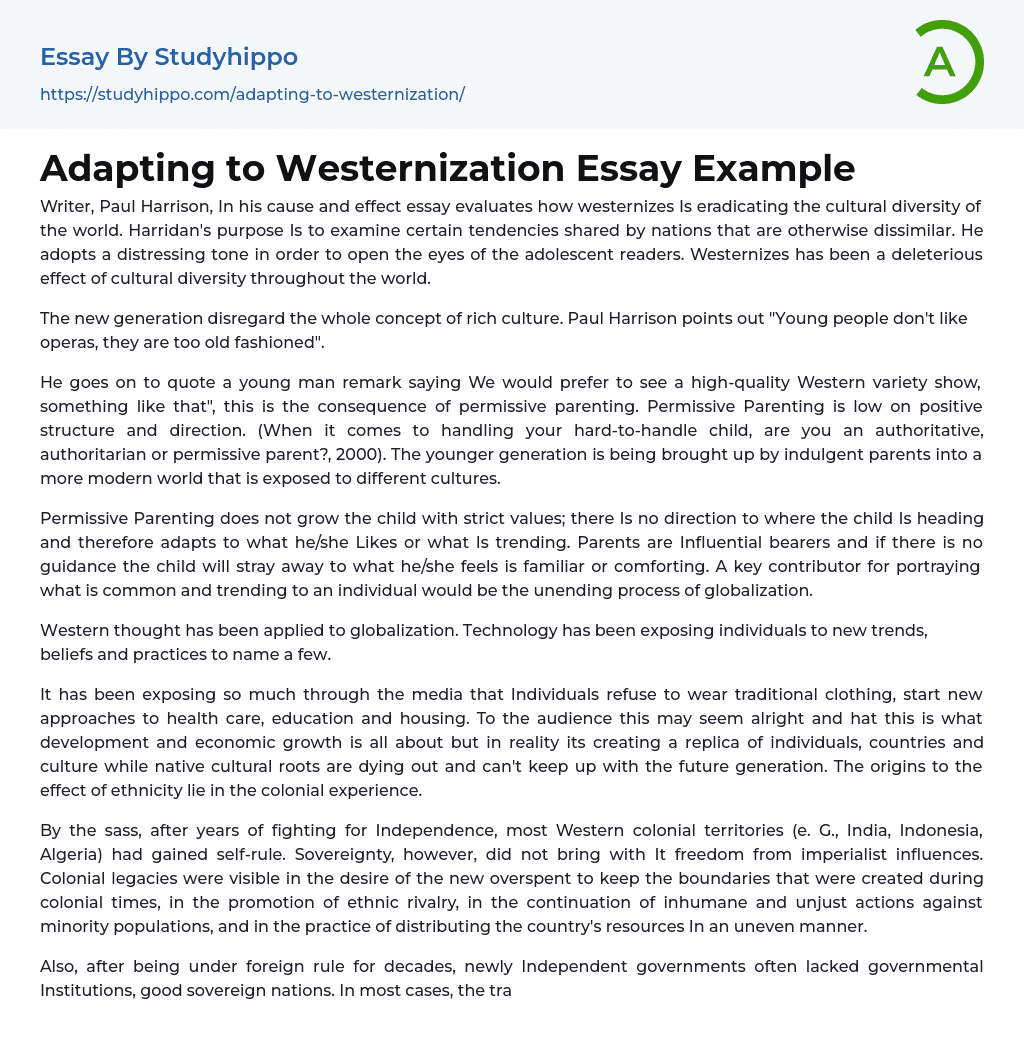In his cause and effect essay, Paul Harrison expresses concern about the global impact of westernization on cultural diversity. Despite acknowledging similarities among different nations, he adopts a distressed tone to raise awareness among younger readers. Specifically, he emphasizes how westernization is harmful to cultural diversity throughout the world.
The text discusses the effects of permissive parenting on children. A young man is quoted as saying that he would prefer to watch a high-quality Western variety show, which suggests that this style of parenting lacks positive structure and guidance. "When it comes to handling your hard-to-handle child, are you an authoritative, authoritarian or permissive parent?" (2000) explains that parents who adopt a permissive approach may struggle with difficult behavior from their children. This indulgent style means that younger generations are growing up in a divers
...e modern world.
Permissive Parenting can result in a lack of direction for children as strict values are not instilled. Consequently, children may be drawn to what is trendy or appealing without any guidance or plan. As parents are vital role models, it is essential to provide guidance to prevent children from straying away from familiarity and comfort. Globalization plays a significant role in depicting popular trends to individuals.
The media has shown how people are rejecting traditional clothing and adopting new methods for healthcare, education, and housing. While this may be viewed as a sign of progress and economic growth, it is actually eradicating cultural roots and homogenizing individuals, countries, and cultures. This is particularly problematic as older generations can't keep up with changes. The source of this loss of ethnic diversity can be traced back to colonialism.
I
the aftermath of the Sass, many Western colonies such as India, Indonesia, and Algeria gained self-rule after years of striving for independence. Nevertheless, achieving sovereignty did not ensure a release from imperialist impacts. The vestiges of colonialism persisted in the attempt of the new regime to preserve colonial borders, encourage ethnic tensions, maintain oppressive actions against minority populations, and distribute the nation's resources unfairly.
Following prolonged foreign rule, newly independent governments frequently suffered from a dearth of robust governmental institutions necessary for the establishment of strong, self-determining nations. Typically, the journey from colonial territory to independent state was a grueling and often tumultuous process.
The act of indigenous people embracing the habits and lifestyles of a social group they desire to be part of, at the cost of abandoning their own culture, is known as ethnocentrism. The purpose behind this adoption is to attain equal acceptance and recognition as human beings by individuals with higher social status (p. 69).
The world is increasingly adopting a uniform 'European Road' with cloned societies, infrastructure and ways of life. This trend is driven by cultural groups seeking equality, resulting in many countries mimicking or attempting to follow the same path as Europe. Even underdeveloped nations with low standards of living are emulating the Western Hemisphere due to their economic success, higher living standards, and continued progress in globalization.
Underdeveloped nations see western culture as the key to their economic success. Although countries such as India, Turkey, China, and Japan initially opposed western influence, they eventually succumbed to its importance in terms of technology. These nations recognized the significant role that technology played in adapting to neighboring countries'
military advancements.
According to Paul Harrison, Wee Yuan, the administrator, urged his fellow countrymen to acquire the advanced technology of the barbarians so they could dominate them. This strategy was implemented successfully. To thrive in today's globalized world, a nation must stay current, just like Western societies do.
The notion of succeeding in today's world is often associated with keeping up with the continuous process of globalization. However, this perspective fails to acknowledge how strict adherence to certain values that can lead to divisions across generations. It is possible to adapt to globalization while staying true to one's cultural heritage through self-discipline. This way, cultures can persist for future generations without any issues.
- Rabbit essays
- Distribution essays
- Large Animals essays
- Mouse essays
- Poultry essays
- Animal Abuse essays
- Cats Vs Dogs essays
- Cattle essays
- Territory essays
- Child essays
- Childcare essays
- Child labor essays
- Doll essays
- Christopher Columbus essays
- Pilgrims essays
- Simon Bolivar essays
- Exploration essays
- Popular Culture essays
- Car Culture essays
- American Culture essays
- Mormon essays
- Indian Culture essays
- Mexican Culture essays
- Pop Culture essays
- Cultural Differences essays
- Culture Shock essays
- Different Cultures essays
- Single Parent essays
- Single Parenting essays
- World War I essays
- World War Ii essays
- Atomic Bomb essays
- American Civil War essays
- Attack essays
- Cold War essays
- Crimean War essays
- Emilio Aguinaldo essays
- Iraq War essays
- Korean War essays
- Nazism essays
- Nuclear Weapon essays
- Philippine Revolution essays
- Trench Warfare essays
- Vietnam War essays
- Western Front essays
- Diplomacy essays
- Emperor essays
- Rwanda essays
- Tribe essays
- Revolutionary War essays




